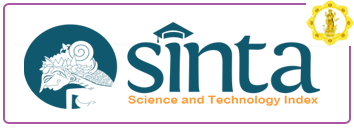THE EVOLUTION OF TECHNOLOGY ACCEPTANCE MODEL (TAM) AND RECENT PROGRESS ON TECHNOLOGY ACCEPTANCE RESEARCH IN ELT: STATE OF THE ART ARTICLE
Abstract
improves the integration of technology for the academic purpose. This phenomenon then
raises an issue of technology acceptance, which becomes an interesting field of investigation
for many scholars. In this respect, Technology Acceptance Model (TAM) has proven to be a
robust, powerful, and parsimonious framework for predicting user acceptance of
technology integration in various fields (Lai, 2017; Rondan-Cataluna et al., 2015). Although
there is a lot of research studies reported the use of TAM and its developed versions in
investigating the technology acceptance in the educational field, there is no publication that
trying to map current studies which focus on educational technology acceptance research
especially in ELT. Based on the needs of providing such information, this article would
present the state of the art of the current research trends on the application of TAM
framework in investigating ICT integration acceptance in ELT. The main part of this article
would describe the evolution of TAM framework, followed by the discussion of recent
research results concerning the technology acceptance, and the future trends of technology
acceptance research in ELT. This state of the art article is expected to inspire other researchers
to conduct further studies on technology acceptance in ELT and also suggest the ELT
practitioners about the current and future trends in technology integration for academic
purpose.
Keywords
Full Text:
PDF (Bahasa Indonesia)References
Acceptance of Smartphone as a Mobile Learning Tool: Students of Business Studies in Bangladesh. Malaysian Online Journal of Educational Technology, (6)2, 38-47. http://dx.doi.org/10.17220/mojet.20
04. 003
Alharbi, O., Alotebi, H., Masmali, A., Alreshidi, N. 2017. Instructor Acceptance of Mobile Learning in Saudi Arabia: A Case Study of Hail University. International Journal of Business and Management, (12)5, doi:10.5539/ijbm.v12n5p27
Ali, R.A., Arshad, M.R.M. 2016.
Perspectives of Students’ Behavior towards Mobile Learning (M- learning) in Egypt: an Extension of the UTAUT Model. Engineering, Technology & Applied Science Research, (6)4, 1109-1114. www. etasr.com
Al-Seghayer, K. 2016 ESL/EFL Instructors’ Perceptions of the Efficacy of Online Reading Instruction. International
Journal of Linguistics, (8)4, 119-132. http://dx.doi.org /10.5296/ijl.v8i4. 9571
Alzaidiyeen, N.J. 2017. English as a Foreign Language Students Attitudes towards the Utilization of iPad in Language Learning. Malaysian Online Journal of Educational Technology, (5)3, 16-24. www.mojet.net
Celce-Murcia, M. 2007. Rethinking the Role of Communicative Competence in Language Teaching. In Soler, E. A., Jordà, M. P. S. (Eds.), Intercultural Language Use and Language Learning (pp. 41-57). Netherland: Springer. DOI. 10.1007/978-1-4020-5639-0_3
Chaka, J.G., Govender, I. 2017. Students’ perceptions and readiness towards mobile learning in colleges of education: a Nigerian perspective. South African Journal of Education, (37)1, 1-11. doi: 10.15700/saje.v37 n1a1282
Chung, H.H., Chen, S.C., Kuo, M.H. 2014.
A Study of EFL College Students’ Acceptance of Mobile Learning. Social and Behavioral Sciences, (176), 333-339. doi: 10.1016/j.sbspro
.2015.01.479
Davis, F.D. 1989. Perceived Usefulness, Perceived Ease of Use, and User Acceptance of Information Technology. MIS (Management Information System) Quarterly, (13)3, 319-340.
http://www.jstor.org/stable/249008 Davis, F.D., Bagozzi, R.P., and Warshaw,
P.R. 1989. User Acceptance of Computer Technology: A Comparison of Two Theoretical Models. Management Science, (35)8,
-1002.
https://www.researchgte.net
Davis, F.D. 1993. User Acceptance of Information Technology: System Characteristic, User Perception and Behavioral Impact. International Journal of Man-Machine Studies, (38)3, 475-487.
https://doi.org/10.1006/imms.1993.1 022
Dizon, G. 2016. Quizlet in the EFL Classroom: Enhancing Academic Vocabulary Acquisition of Japanese University Students. Teaching English with Technology, 16(2), 40-56, http://www.tewtjournal.org
Hashim, H., Yunus, M.M., & Embi, M.A. 2016. Pre-University English as Second Language (ESL) Learners’ Attitude towards Mobile Learning. Creative Education, (7)8, 1147-1153. http://dx.doi.org/10.4236/ce.2016.78 119
Lai, P.C. 2017. The Literature Review of Technology Adoption Models and Theories for the Novelty Technology. Journal of Information Systems and Technology Management, (14)1, 21-38. DOI: 10.4301/S1807-
Lebzar, B., Jahidi, R. 2017. Factors Influencing the Acceptance of M- Learning by Students of Higher Education in Morocco. International Journal of Emerging Research in Management & Technology, (6)6, 258-
www.ermt.net
Mussa, I.H. & Izkair, A.S. 2017. The Acceptance of Using Mobile Assisted Language among EFL and ESL Students. International Journal of Contemporary Applied Sciences, (4)5, 1-11. www.ijcas.net
Pew Research Center.2018. Mobile Fact Sheet: Who owns cellphones and smartphones? Online. Accessed on 8th April 2018, from http://www.pewinternet.org
Rondan-Cataluña, F.J., Arenas-Gaitán, J., and Ramírez-Correa, P.E. 2015. A comparison of the different versions of popular technology acceptance models: A non-linear perspective. Kybernetes, (44)5, 788-805.
https://doi.org/10.1108/K-09-2014- 0184
Venkatesh, V. & Davis, F.D. 1996. A Model of the Antecedents of Perceived Ease of Use: Development and Test. Decision Science, (27)3, 451-481.
https://goo.gl/52VTqm
Venkatesh, V. & Davis, F.D. 2000. A Theoretical Extension of the Technology Acceptance Model: Four Longitudinal Field Studies. Management Science 46(2), 186-204. http://dx.doi.org/10.1287/mnsc.46.2. 186.11926
Venkatesh, V. 2000. Determinants of Perceived Ease of Use: Integrating Control, Intrinsic Motivation, and Emotion into the Technology Acceptance Model. Information Systems Research, (11)4, 342-365.
https://goo.gl/wYQzzi
Venkatesh, V. & Bala, H. 2008. Technology Acceptance Model 3 and a Research Agenda on Interventions. Decision Science, (39)2, 273-315.
https://doi.org/10.1111/j.1540- 5915.2008.00192.x
Venkatesh, V., Morris, M.G., Davis, G.B., & Davis, F.D. 2003. User Acceptance of Information Technology: Toward
a Unified View. MIS Quarterly, (27)3, 425-478. http://www. jstor.org/stable/30036540
Venkatesh, V., Thong, J.Y.L, Xu, X. 2012. Consumer Acceptance and Use of Information Technology: Extending the Unified Theory of Acceptance and Use of Technology. MIS Quarterly, (36)1, 157-178.
http://www.jstor.org/stable/414104 12
Venkatesh, V., Thong, J.Y.L, Xu, X. 2016. Unified Theory of Acceptance and Use of Technology: A Synthesis and the Road Ahead. Journal of the Association for Information Systems. (17)5, 328-376. https://goo.gl/ qiwY17
Wei, L.M., Piaw, C.Y., Kannan, S., Moulod, S.A. 2016. Relationship Between Teacher ICT Competency And Teacher Acceptance And Use Of School Management System (SMS). Malaysian Online Journal of Educational Technology. (4)4, 36-52. www.mojet.net
Zyad, H. 2016. Technology-mediated ELT Writing: Acceptance and Engagement in an Online Moodle Course. Contemporary Educational Technology, (7)4, 314-330. https://eric. ed. gov/?id=EJ1117601
DOI: https://doi.org/10.25078/yb.v1i2.724
Refbacks
- There are currently no refbacks.
Yavana Bhasha : Journal of English Language Education is indexed by

Yavana Bhasha : Journal of English Language Education site and its metadata are licensed under CC BY-SA



